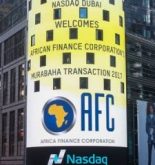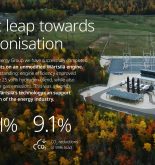By Oke Peter
In demonstration of its commitment to the empowerment and realisation of sustainable energy, leading financial institution in Nigeria, First City Monument Bank (FCMB) in partnership with a solar solution provider, OneWattSolar have brought together experts in the field of renewable energy, solar systems, finance and Blockchain technology to discuss opportunities for innovative financing of renewable energy systems.
The networking event with the theme: ‘Blockchain Technology in Energy Access Finance for Africa’ was recently held in Lagos. Members of the panel were drawn from FCMB; OneWattSolar; Climate Finance Advisory; All On Partnership for Energy; Digital Transactions Services; United States Agency for International Development (USAID) and African Mini grids Developers Association (AMDA). They discussed new project, OneWattSolar, aims at leveraging the blockchain technology to raise funds for solar home systems. Some of the key issues discussed include Finance, Blockchain Technology, and Renewable Energy Potentials, Foreign and local investment among others.
The Finance
Findings have shown that Commercial banks do not fully understand the renewable energy space the reason OneWattSolar is working with experts like GIZ and USAID to reduce risks associated with renewable energy. Also, people do not buy into solar systems because they see renewable energy experts as solar vendors. Interestingly, with blockchain technology, people will get power as an asset that brings installation cost down to zero. Also, renewable energy assets are listed on the blockchain and Nigeria requires about N1 trillion annually to get access to energy.
The Blockchain Technology
Leaving a collective financial asset base or investment with one or a few people can be risky, but this can be improved using a transparent shared ledger, which many people can update and it is popularly referred to as Blockchain Technology. Many people can now download the ledger as software, the ledger copies are like servers that communicate and sync with one another on the internet. Recently the World Bank issued a bond on the Blockchain, because it is the future of economic transaction, due to the fact that it is better than paper-based record keeping system. Interestingly, there is over $300 to $400 billion fund available in the crypto currency space, which is at low and the market capitalisation is almost 20 times the Nigerian Stock market.
Renewable energy potentials Investigations have revealed that about 600 million Africans are either underserved or do not have access to energy. According to a report by GIZ, decentralised utility has enormous opportunities and in the next 15 years, this decentralised utility will provide electricity and end energy poverty to about 100 million people out of the 600 million without access to electricity. Also, about 8,000 potential sites are available and have been identified for mini grid development, but there are only 40 mini grids currently operating as a business model. However, new solutions like smart prepaid meter that is monitored automatically and Renewable Energy fund worth N2 billion was recently launched in Nigeria.
Donor organisations
Based on research, people spend about $82.5 million on energy in the South-South only. Others showed that mini grids have the potential to generate revenues of up to $110 million annually. So, with these kinds of opportunities and market, it is believed that the off-grid sector is at a tipping point in Nigeria and Africa.
All-On is sponsored by Shell to invest in clean energy companies providing various instruments like equity and debt, while some of the organisation’s innovative finance schemes include result-based financing, which requires the innovators to use their funds first before they are assisted with fund.
Moreover, an Off-grid energy fund was recently launched with funds from Nordic Development Fund and African Development Bank (AfDB), while Crowdfunding is also important to meeting up with the debt need.
OneWattSolar Solution using Blockchain to access energy finance
OneWattSolar is trying to solve the energy access problem by leveraging Blockchain technology and cryptocurrency. Most people will like to have solar systems but cannot afford to pay upfront. The organisation is offering a service where consumers do not have to pay for the installation of solar systems. The benefit of this service includes metering; where customer pays for energy consumed. On the other hand, with One Watt Token (OWT), a cryptocurrency tradable on the cryptocurrency exchange, this is a utility token that can leverage blockchain technology. In addition, if investors both local and international buy into the ecosystem and this tokens, OneWattSolar uses the fund to deploy solar installations in pre-registered houses, the customer will use energy and pay for it, while a part of the revenue goes the investors over the duration of the project. As an investor in the block or any particular mini grid, consumer can see the number of people using the system, energy projections, as well as forecast on the investment.
First City Monument Bank’s partnership
First City Monument Bank is creating platforms for engagement in the renewable energy space. This is a new sector in the financial sector that is coming up in terms of funding from commercial banks. The bank pioneered renewable energy funding the reason it is partnering with agencies like IFC, World Bank, DFID to create an enabling environment towards getting a financial model that works for Nigeria. The bank understands that there might be a long gestation period for this project to mature but it is committed to adding value to renewable energy business.
Recommendations
For the sector to grow, meaningful partnerships have to be formed with financiers and platforms that will improve access to energy. Also, power is a utility and social service and must be made affordable to customers. Galvanizing local currency is necessary for investment in clean energy and to drive this sector forward a lot of developers will have to come on board.
Conclusion
Stakeholders in the renewable energy space are keen on working with traditional financial institutions to drive financing for projects, but it is important that such financial institutions have a renewable energy policy. Blockchain technology is coming up to be an enabler for financing, data management, and integration across all levels of the value chain. It is an emergent technology that speaks to trust, removes intermediaries and it decentralises energy to give power to the people.
OneWattSolar installs solar home systems without requiring upfront payments from the users; they only pay for the energy that they consumed.
Visit www.onewattsolar.com to find out more about OneWattSolar.






